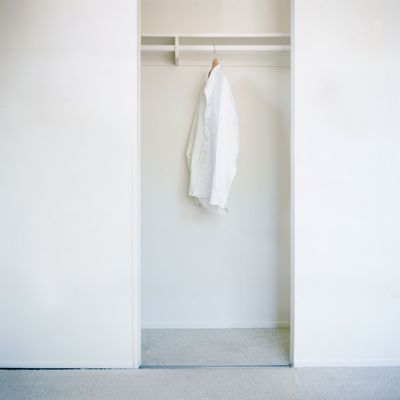
“Can you remind me of your address? I have a gift for you,” I said to an old friend. “What is it?” she asked. “A seashell I found on the beach,” I replied. It was a flawless seven-inch perverse whelk, white with whirling brown stripes that reminded me of a caramel sundae. You could hear the ocean in it.
She thanked me but asked me not to send it. “I’m trying to de-clutter,” she explained. I gasped in horror. “Are you rejecting my gift because of Marie Kondo?!”
Japanese lifestyle guru Marie Kondo is the author of The Life-Changing Magic of Tidying Up, a self-help best seller that has sold more than 2 million copies worldwide. She studied feng shui and used to work at a Shinto shrine. She has been compared to a princess, a fairy, and a snowflake. She was one of Time’s 100 Most Influential People of 2015.
She is driving me insane.
It’s not that Kondo’s jihad on messiness isn’t admirable. In her book, Kondo claims that a clutter-free living promotes confidence, serenity, and “the energy and motivation to create the life you want.” Given the sheer number of people who have embraced her philosophy, I gather that she gets results. And by “gather,” I mean that since the English translation of Tidying Up hit shelves last fall, there has been no way to avoid the exuberant exhortations of Kondo acolytes at every brunch, happy hour, and dinner party; on Twitter, Instagram, and your college roommate’s Facebook wall; at baby showers, bridal showers, and Mother’s Day teas. The “KonMari method” for cleanliness is the new juice fast, the new SoulCycle, the new organic food. Which is to say: It is a method for self-improvement that inspires cultlike evangelism — and passive-aggressive social warfare masquerading as cultlike evangelism. Once upon a time, your cruelest frenemies would watch you snacking on Tostitos, then announce how much weight they lost by giving up gluten. Now, they arch an eyebrow as you dig through the junk at the bottom of your purse, and pointedly ask whether you read that amazing book, the one about tidiness?
On multiple occasions in the last year, a guest has entered my home and said the word “Kondo” while eyeballing my stuff. This will never not be an insult. (For the record, I’m not mad at my gift-rejecting friend. I regard the situation the way that I imagine one might regard a friend who is taken in by a cult: saddened and dismayed but forgiving. I hope it’s just a phase.)
I understand that most Kondo-ites have good intentions. They belong to a larger anti-messiness movement that is both laudable and necessary. Last year, The Wall Street Journal noted that the rise of the cult of Kondo “coincides with the recovering economy, an increase in donations of clothing and household goods to charity, and a trend toward downsizing as U.S. population growth shifts from the suburbs to city centers.” And the Journal isn’t the only one associating cleanliness with virtue: A recent University of Minnesota study found that people who work at tidy desks are more likely to eat healthy, give to charity, and follow rules. (So Kondo’s claim that de-cluttering can help you lose weight isn’t total fantasy.) Meanwhile, a Rice University study found that merely gazing at a messy environment makes people more likely to cheat or lie for personal gain.
Correlating health with cleanliness plays into a broader tendency to associate material excess with addiction. It’s no coincidence that Hoarders and Intervention started on the same TV network. Meanwhile, five months after Tidying Up arrived Stateside, American cleaning guru Peter Walsh released his latest self-help guide: Lose the Clutter, Lose the Weight: The Six-Week Total-Life Slim Down. So it’s no surprise that the same social forces that animate healthy-living movements — and backlashes against them — are now animating the way we talk about clutter.
In 2013, Vanessa Grigoriadis called the juice cleanse “a new emblem of modern urban virtue, self-control, and simplicity.” In 2015, the same can be said for de-cluttering. Just as juicers simultaneously glorify and deny food — obsessing, for instance, over the power of kale while consuming it only in strictly portioned quantities — Kondo portrays her zeal for de-cluttering as a form of respect for material goods. (She devotes an entire chapter to “Treating Your Socks and Tights With Respect,” which basically comes down to folding them very carefully.) Before throwing away any object that has ceased to “spark joy,” Kondo instructs her followers to thank the object for its service. If dietary evangelism has its quasi-religious roots in asceticism and mortification of the flesh, then Kondo’s minimalism is part animism, part Zen.
As I’ve said, I have a respect for those who enjoy this way of life. And Marie Kondo sounds like a fascinating person! And yet I will never join her following. I could couch my stubbornness in philosophy. (Lisa Miller persuasively argued for clutter as a form of preparedness on this very website. And studies suggest that clutter sparks creativity!) But the truth is, respecting my socks just isn’t that high on my priority list. Neither is de-cluttering. Besides, the cult of Kondo doesn’t fit my style: Thanking garbage strikes me as dorky, and personifying a purse seems embarrassingly twee. I cling to my clutter for the same reason I cling to gluten-rich foods and non-liquefied vegetables: a matter of taste.
And so, to those who keep asking: Yes, I bought The Life-Changing Magic of Tidying Up. It did not spark joy in me. Now I will discard it. Thank you.




